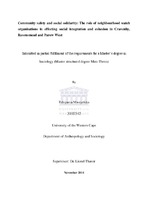| dc.description.abstract | The study explored and examined new forms of social relations at the interpersonal, community and institutional levels that have emerged in the social organisation of Neighbourhood Watch Organisations in Parow West, Parow East, Ravensmead and Cravenby, in the Western Cape. The objective of the research was to understand how social solidarities generated through participation in neighbourhood watch organisations, institutional partnerships and working principles influenced and fostered the development of social solidarity, social integration and social cohesion of local communities and a new sense of nationhood. Towards the above end the study made use of a Functionalist perspective based on Durkheim’s concepts of mechanical and organic social solidarity. These functionalist concepts were used to identify and to examine the new forms of social cooperation and associations that emerged in the context of local neighbourhoods, and formally in neighbourhood watch organisations and partnerships engaged in residential property crime preventive measures. The study design which was employed to probe social solidarities in neighbourhoods and local communities made use of qualitative research methodologies. The empirical data was collected from in-depth, semi-structured interviews, as well as focus group discussions with all respondents belonging either to the neighbourhood watch organisations. Alternatively respondents were also drawn from related institutions involved in residential property crime prevention, such as the SAPS. And finally, the data was interpreted within a Durkheimean framework of social solidarity in order to reflect on the extent to which Neighbourhood Watch Organisations have played a significant role in building social solidarity, integration and cohesion in Parow West, Parow East, Ravensmead and Cravenby. This was ultimately done in order to establish an empirical basis to consider the extent to which South African society has moved from apartheid to liberal democratic values and practices from the ground up in Neighbourhood Watch Organisations. | en_US |

